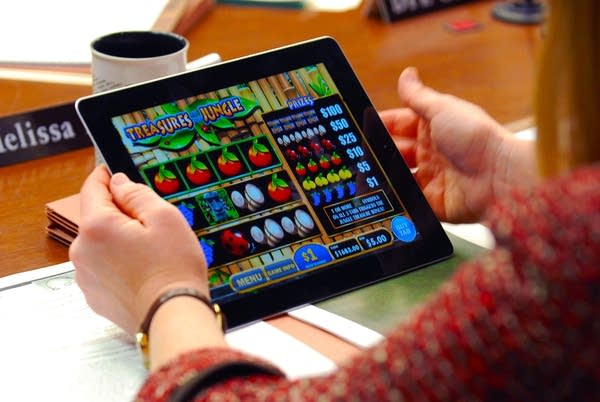Electronic pull-tab gambling misses monthly revenue projections

Minnesota's roll out of electronic pull tabs continues to fall short of projections. After a strong debut in a handful of bars in September, the expansion of the games has been slow, and the games in bars aren't drawing the crowds backers had hoped. Now, calls for change are starting at the Capitol.
The state Gambling Control Board released its monthly numbers at a House hearing last night. Projections a year ago suggested these games would be in 2,500 bars, possibly as soon as October. They were in 140 bars as of a week ago. Distributors are adding, on average, less than 10 a week right now. At the rate they're going, it would late 2017 before the state hit its goal.
Also, the machines out there already aren't making the kind of revenue the state had hoped. The projection had gamblers betting almost $1,400 a day per location. The games made that number for the first three weeks, after which the number dropped to an average of $474 per site in the middle of January. That's just over a third.
Here's the breakdown (story continues below):
Create a More Connected Minnesota
MPR News is your trusted resource for the news you need. With your support, MPR News brings accessible, courageous journalism and authentic conversation to everyone - free of paywalls and barriers. Your gift makes a difference.
The House Commerce Committee held a hearing on the matter last night, and members talked about a number of options, such as putting some state money into marketing the games. Others wanted to change how charities operate gambling, or eliminate the requirement that bars have paper pull tabs before they get electronics.
But the Legislature is only in session until May, so it only has a few months to take action before the state has to start paying for the stadium.
Commerce Committee chair Joe Atkins said he thinks a better backup plan may be necessary -- more than the stadium ticket taxes that the Legislature already approved.
"I'm worried about it right now, and any prudent person starts their worrying sooner rather than later, in order to try to come up with solutions. You hope that it works itself out, but we certainly want to have some possibilities in mind if it doesn't," he said.
Atkins said that he's planning more formal hearings on the games, and may set up a special task force of legislators to try and come up with some solutions.
The problem appears to be a mixture of supply and demand. Minnesota is the first state to legalize this form of gambling. The suppliers say the new games are taking much more paperwork, testing and software coding than anyone anticipated, to get the program off the ground.
But players seem to be reacting cooly to the games, as well. There was talk last year about how a second supplier might drive up interest among more gambling operators and bars. That second distributor started up just before Christmas, and those games are taking less than a quarter of the daily bets of the first version of the game -- the iPads that came out in September.
The machines were each expected to take about $225 a day in bets. The last week of January, they were averaging $104, according to the data just released by the Gambling Control Board. Meanwhile, paper pull tabs are going the other way -- one distributor said he had his best January ever this year. So it's not as if Minnesotans have lost their appetite for gambling.
State officials say some pull-tab operations are wildly successful. Here's a list of the Top 10 sites in Minnesota. Click to enlarge. (Story continues below the chart.)
In the meantime, the state is planning to borrow about 500 million for the project, part its share, and part for the city of Minneapolis's share. Those bonds haven't been sold, so the state hasn't had to make mortgage payments on the new house yet. Officials expect the stadium groundbreaking will still happen in October, and that these gambling games still have almost a year to right themselves.
